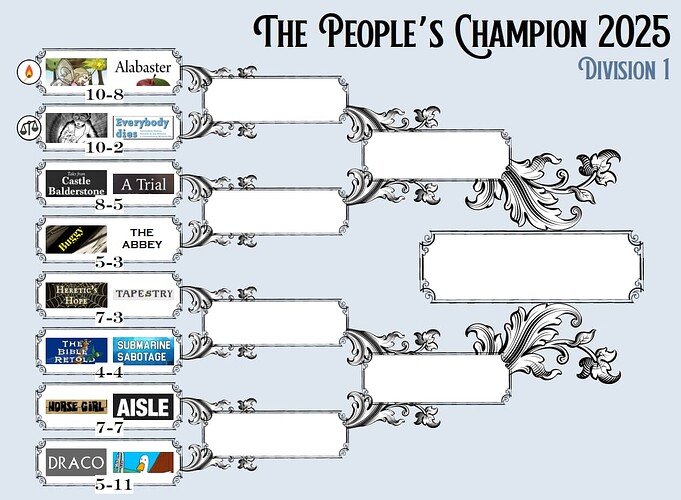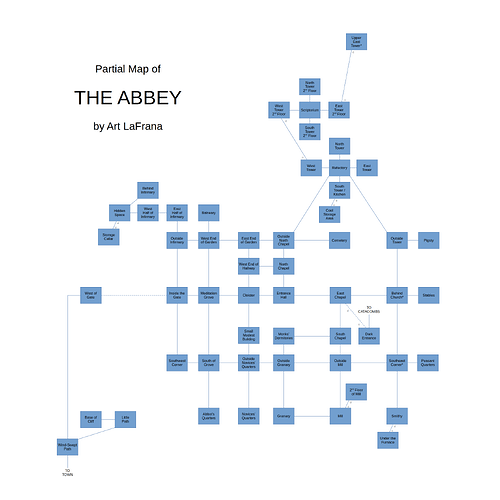It’s interesting because there’s not really a pattern in how people are matching in the matchups yet, which means that there will be more fun uncertainty in how the results go and should make things more exciting.
Alabaster and Six both use multimedia and have good replay value. Alabaster is much darker and has great detail on a couple of characters, while Six is lighthearted and has cute, interesting details on a variety of characters. I voted for Six because I really enjoyed it (and experimented with getting its sound working online at one point), especially the ‘second playthrough’. I can see the appeal of Alabaster, though (which is currently ahead), especially how broad its possible paths are.
While in the first matchup, the short-playthrough experimental game is winning over the traditional-puzzle exploration game, match #2 is reversed. Illuminismo Iniziato (one of the most popular big unapologetic puzzlers of the last decade) is significantly ahead of the writing-focused, relatively shorter Everybody Dies.
In match 3, Tales from Castle Balderstone is far ahead of A Trial, but I think this is a win-win for both sides. Tales from Castle Balderstone is genuinely creepy in places and a lot of fun, so winning makes sense, but A Trial has a unique writing style and has been kind of neglected over the years. So, win or lose, getting a lot of new players to try A Trial and experience its creativity is great for whoever nominated it. This is another instance of a longer, more puzzly game winning out over a shorter one. (although A Trial isn’t inherently super puzzly, just relatively so in this poll).
I won’t say much on Buggy vs Abbey since I’m one of the authors, but I will say that this reverses the trend, since right now Buggy is ahead but Abbey is at least 20x longer (possibly 100x longer).
In matchup 5, Heretic’s Hope is a choice-based game that is soundly ahead of the parser game Tapestry. Both are games that focus on morality and have a lush, stained-glass kind of atmosphere. Heretic’s Hope is very weighty, and has numerous places to go, people to talk to, and great art, with excellent worldbuilding. Tapestry has a lot of symbolism and some wonderful character development. I’d like to imagine that both authors would like each other’s work.
Match 6 is going well for Garry Francis, whose game currently has all the votes. Submarine Sabotage is a puzzly parser game that is substantial but isn’t too hard or too long. The Bible Retold: Following a Star still benefits from attention, like A Trial, since its part of a quirky and unusual parser game series that hasn’t gotten a lot of attention in recent years.
Math 7 and Match 8 is another instance where a short puzzleless game is doing well against a long and puzzly parser game. Aisle is one of the most famous IF games out there but has provoked strong reactions for and against it in the past. It’s firmly seated in real life but explores the edges of what’s acceptable in society (depending on your choices). The Legend of Horse Girl on the other hand is wild and exaggerated with extreme characters and is heavy on dark comedy.
But the final match flips the trend back. Augmented Fourth is firmly ahead, a puzzly parser game that has received steady attention for the last 25 years as a satisfying and very funny adventure game. Winter Storm Draco (which I voted for) is much briefer but has a lot of clever ideas. Both subvert expectations, both use narrative devices in a pleasing way. I just thought Winter Storm Draco was more polished and unique. For me, Augmented Fourth would be like a big chocolate cake from a good grocery store, while Winter Storm Draco would be a small fancy box of chocolates. Both are great, and one provides (to me) some satisfaction for a longer time while the other is really fun for a short time.
So in summary, so far there aren’t any clear deciding lines on ‘this always wins’ or ‘that always wins’ like there were in past competitions. Votes are going both ways in the following categories:
-short vs long
-parser vs choice
-comedy vs drama
-polished vs unpolished (this may be up to debate. I’d say winter storm draco is more polished than Augmented Fourth and that Six is more polished than Alabaster, but others may disagree)

